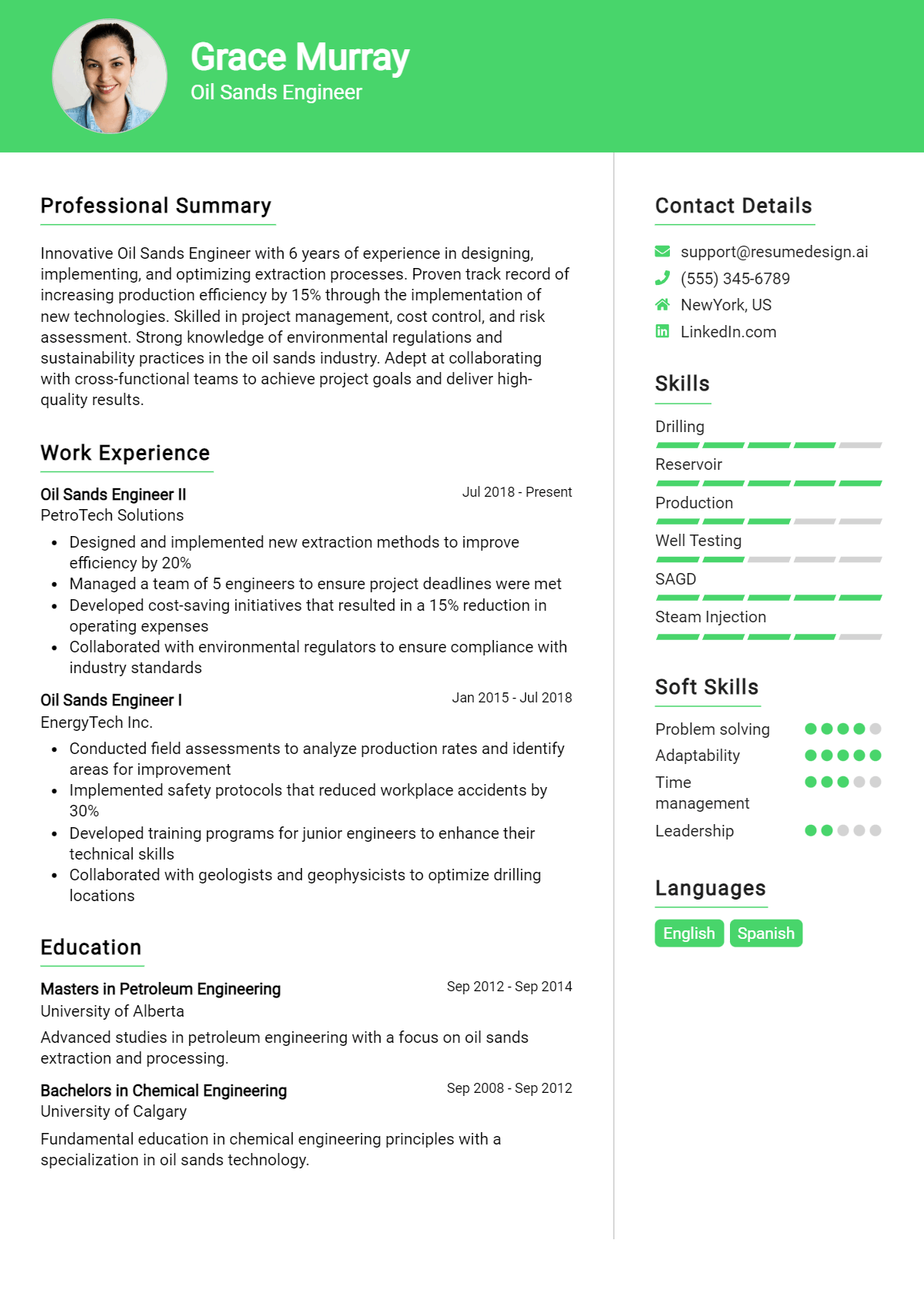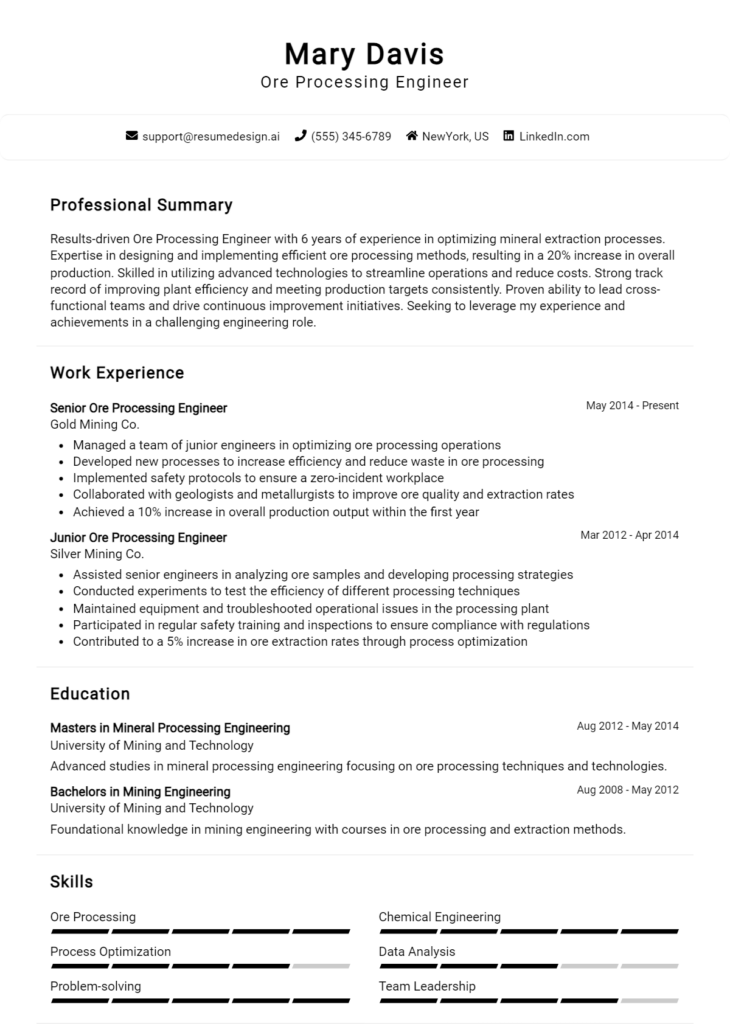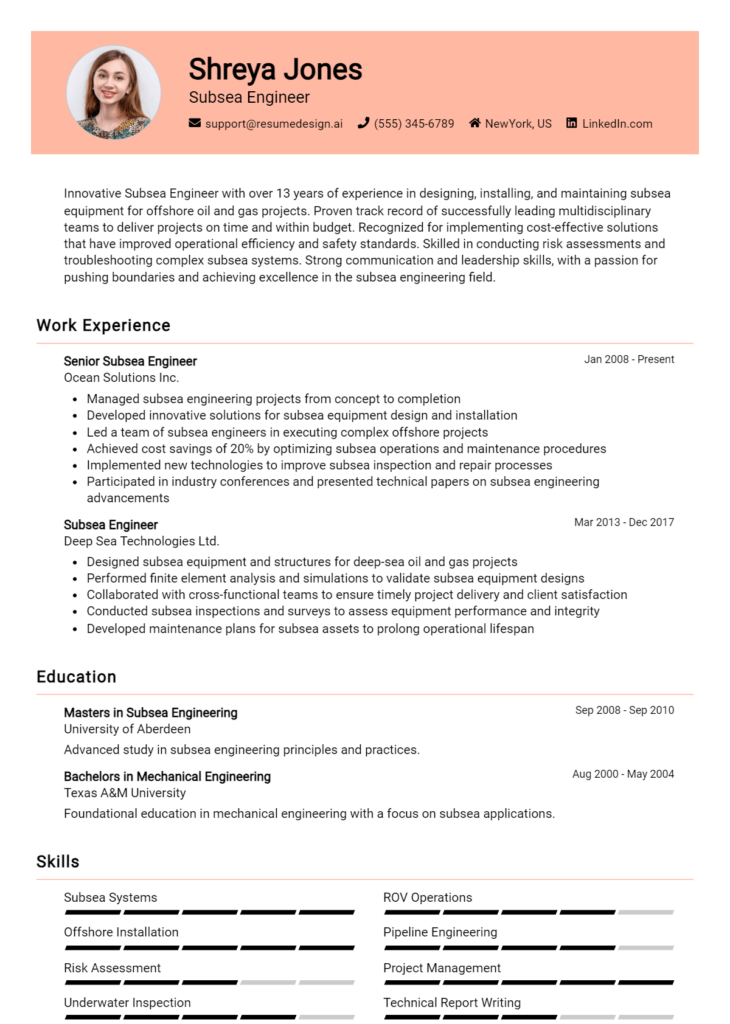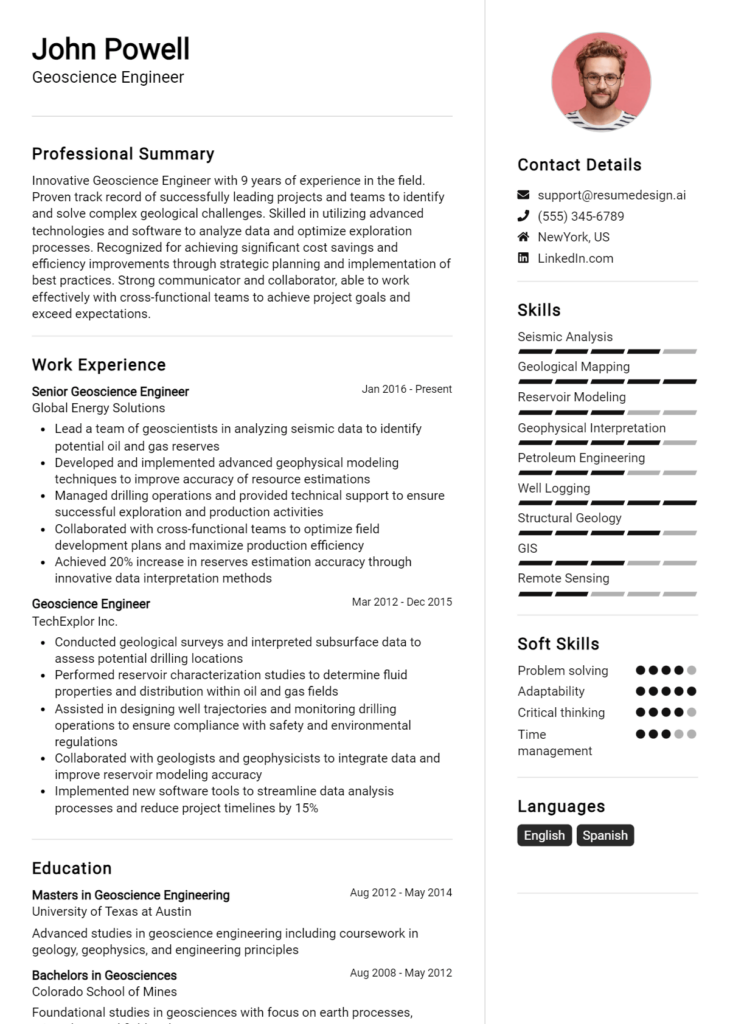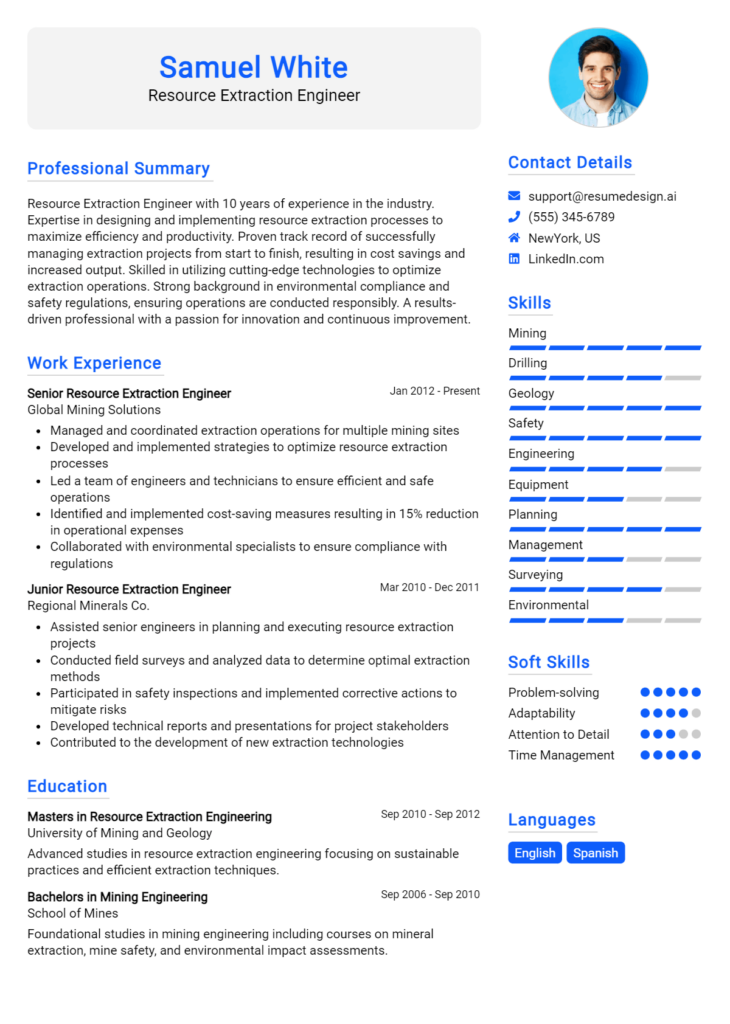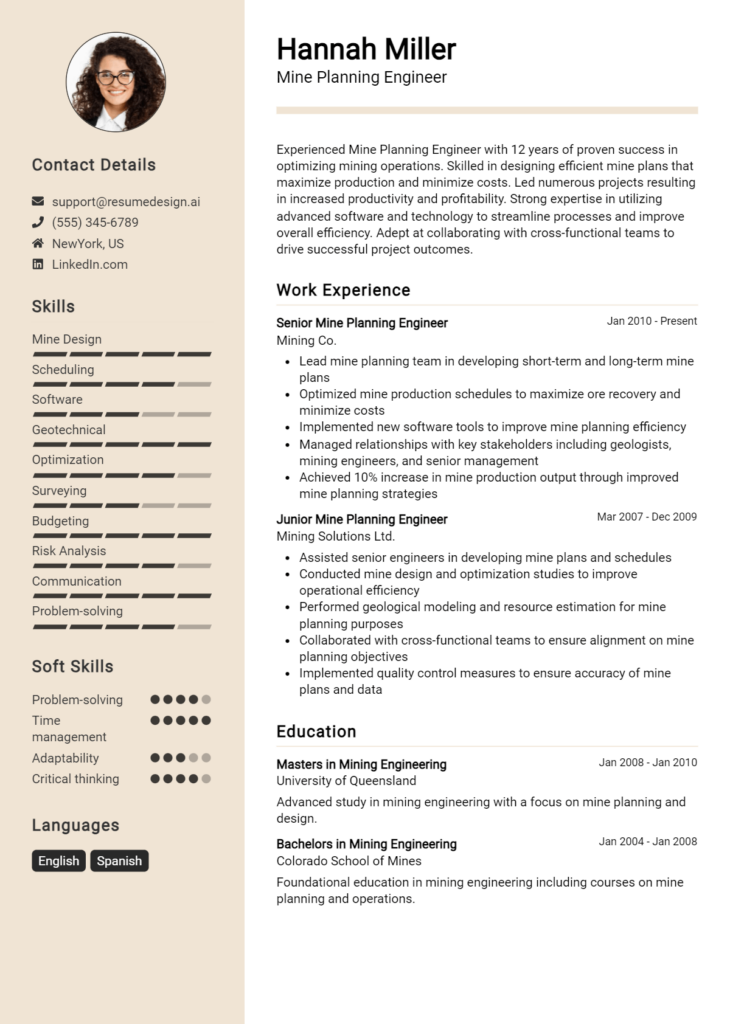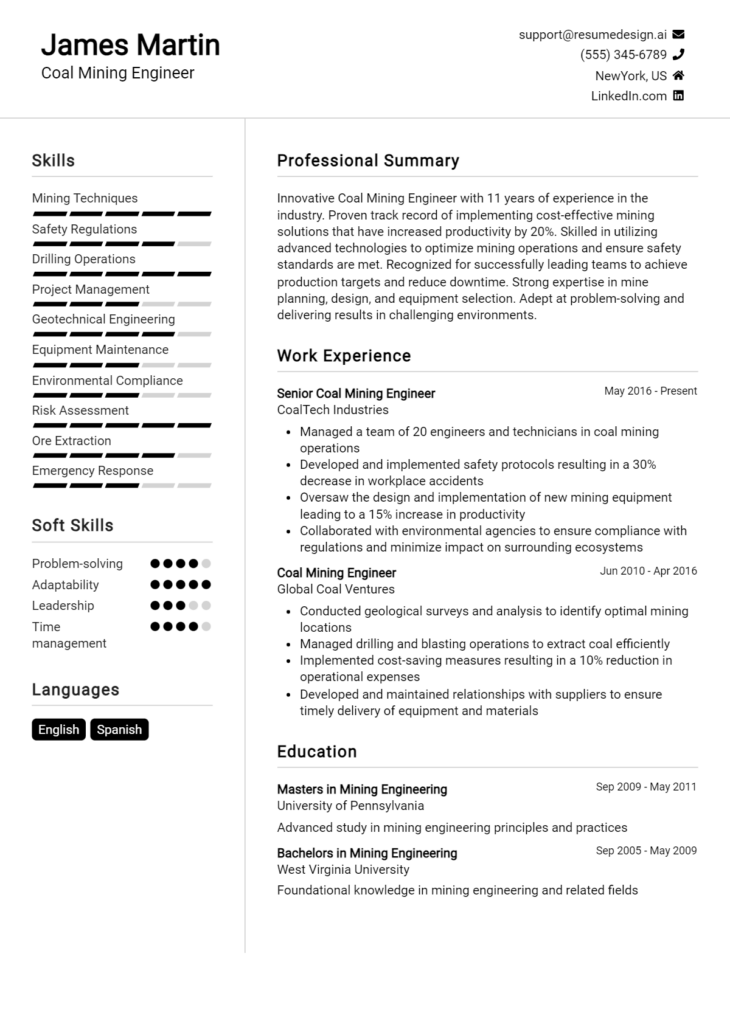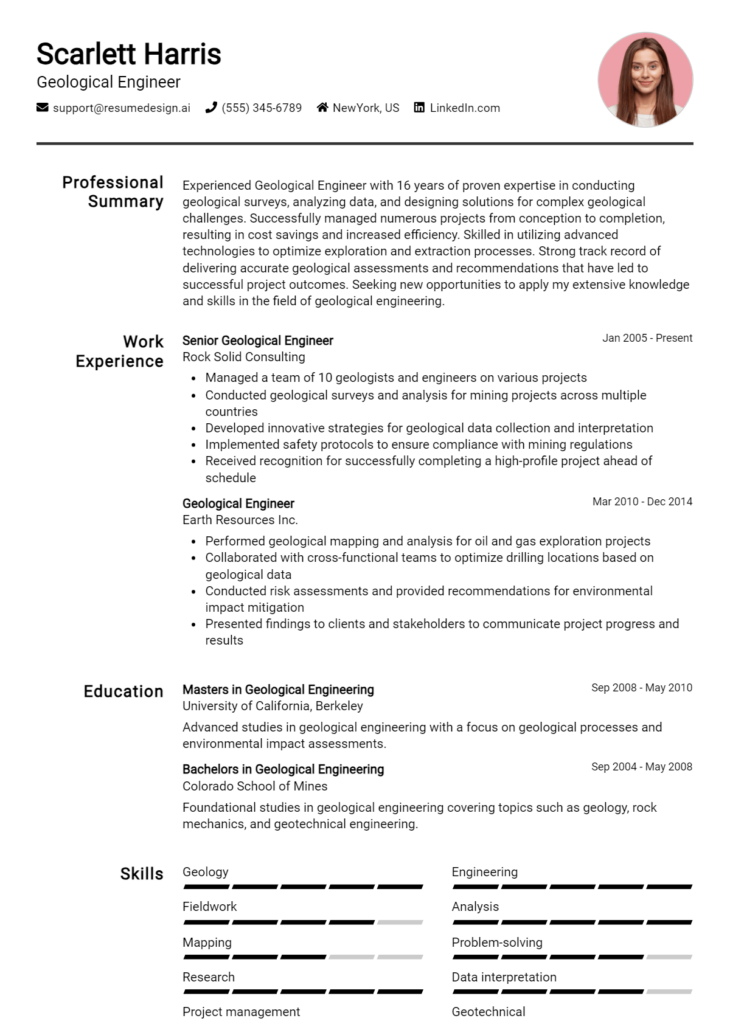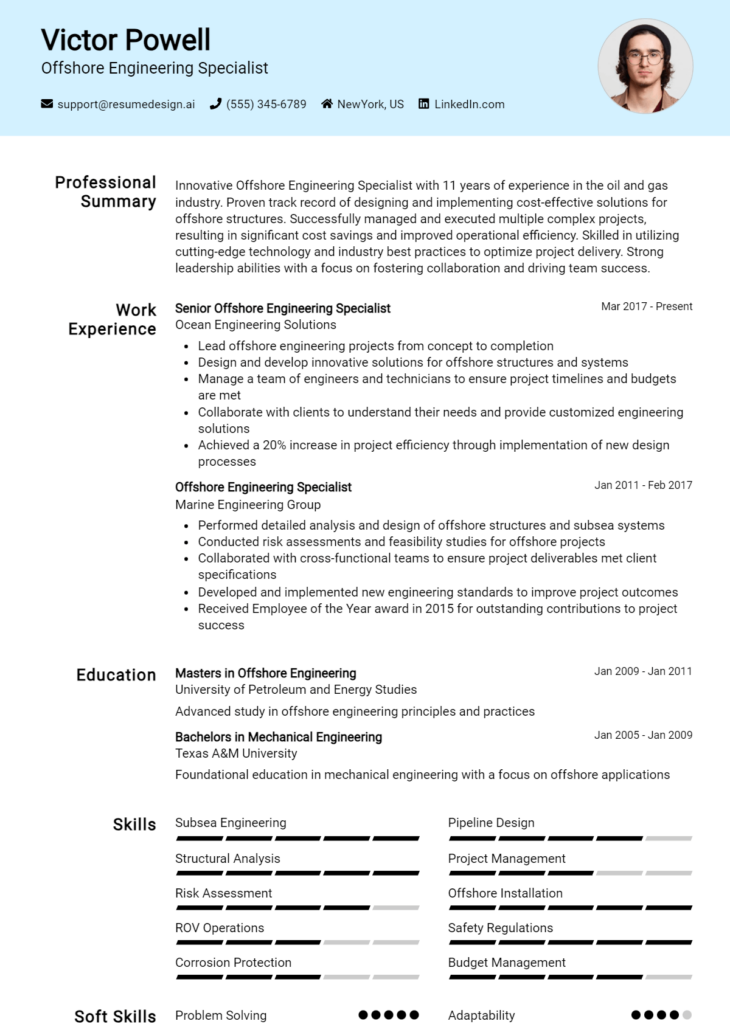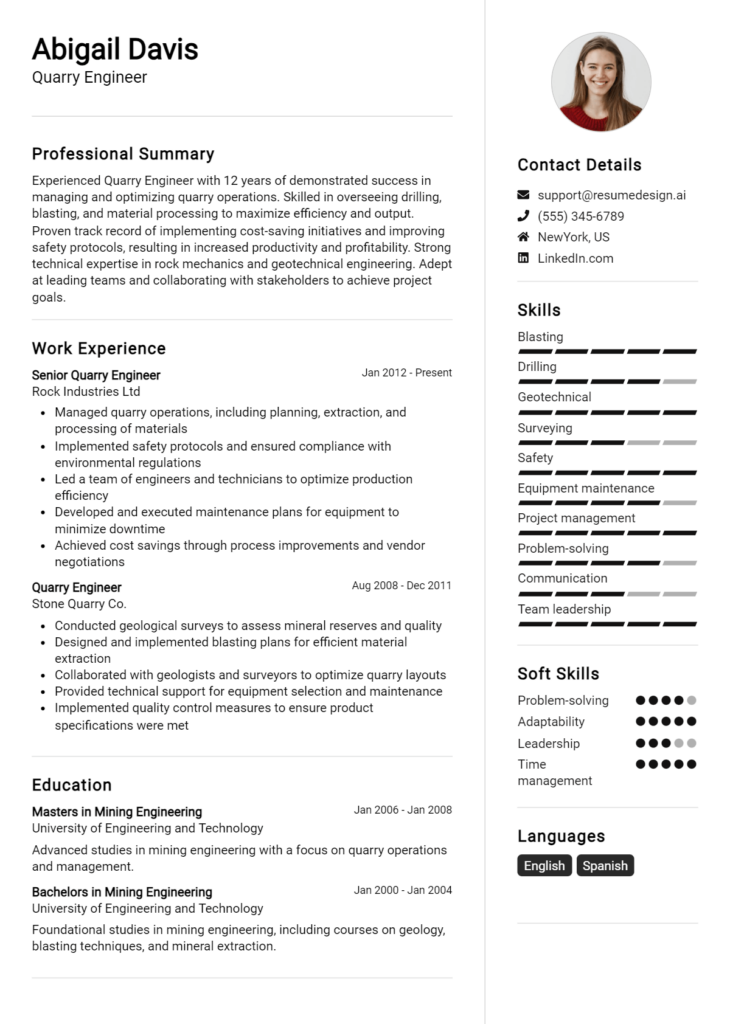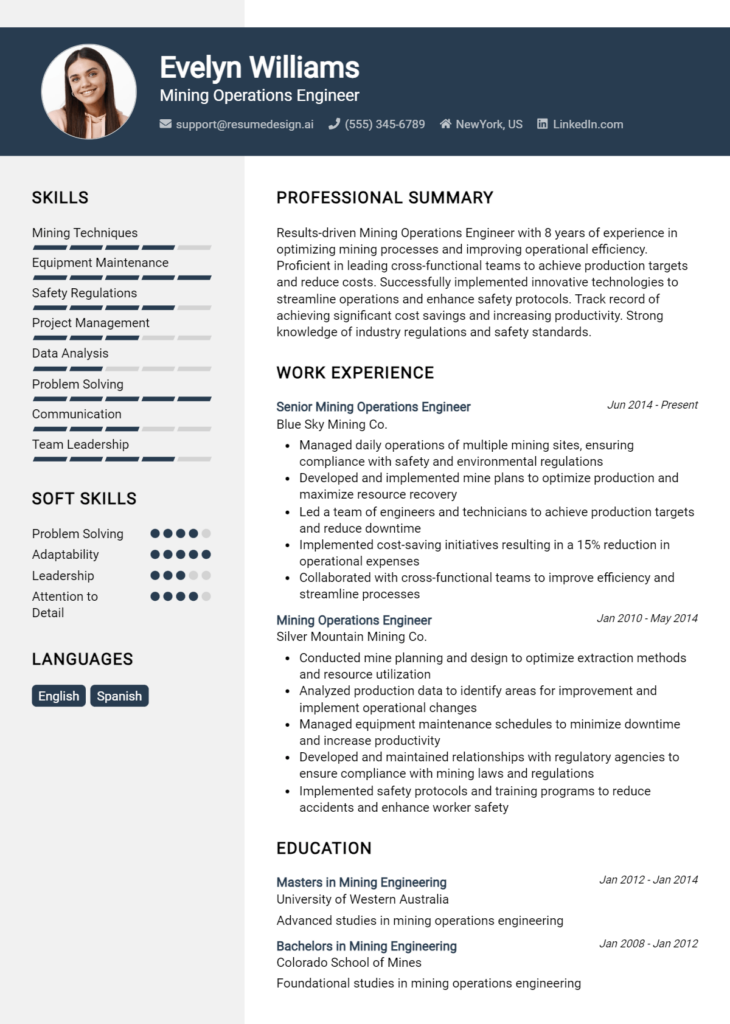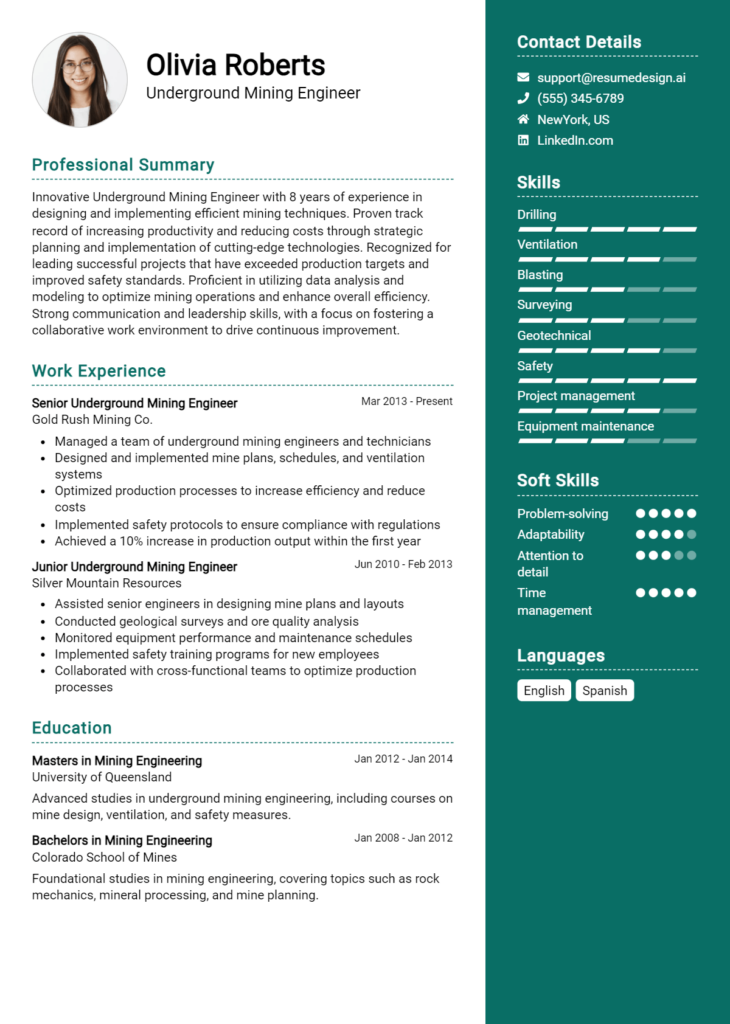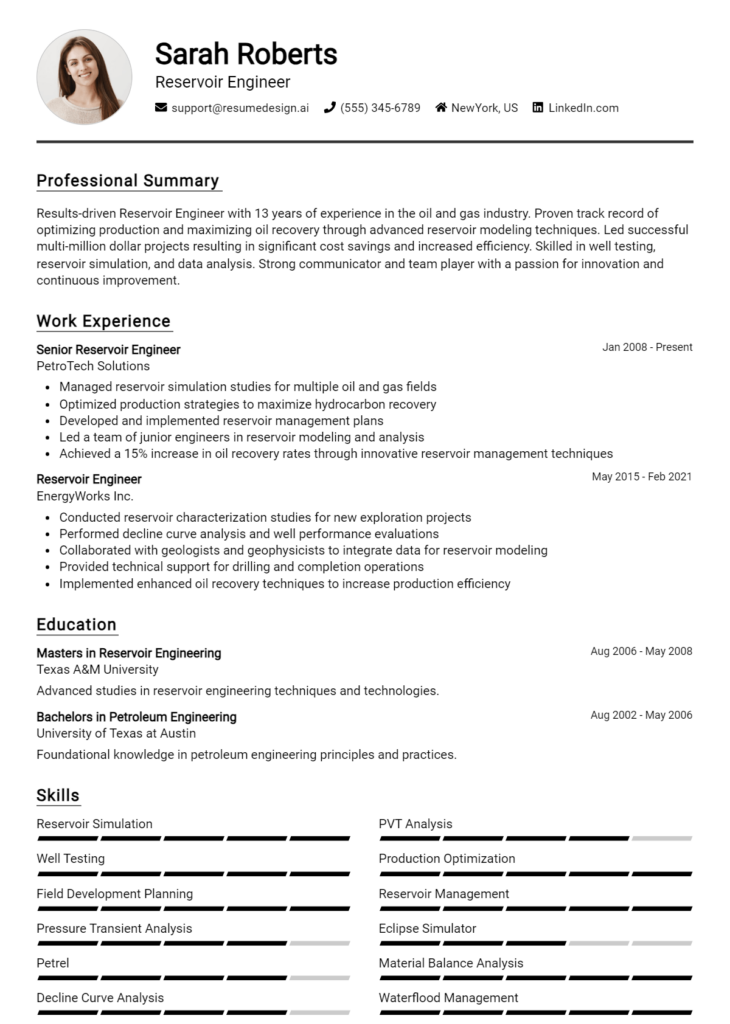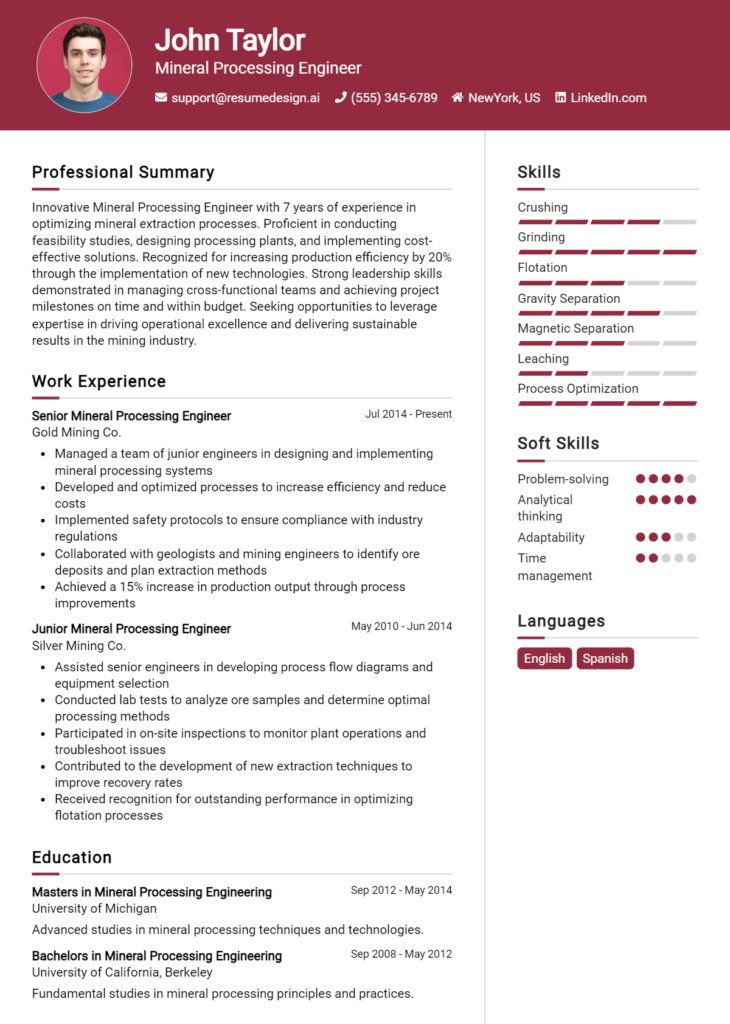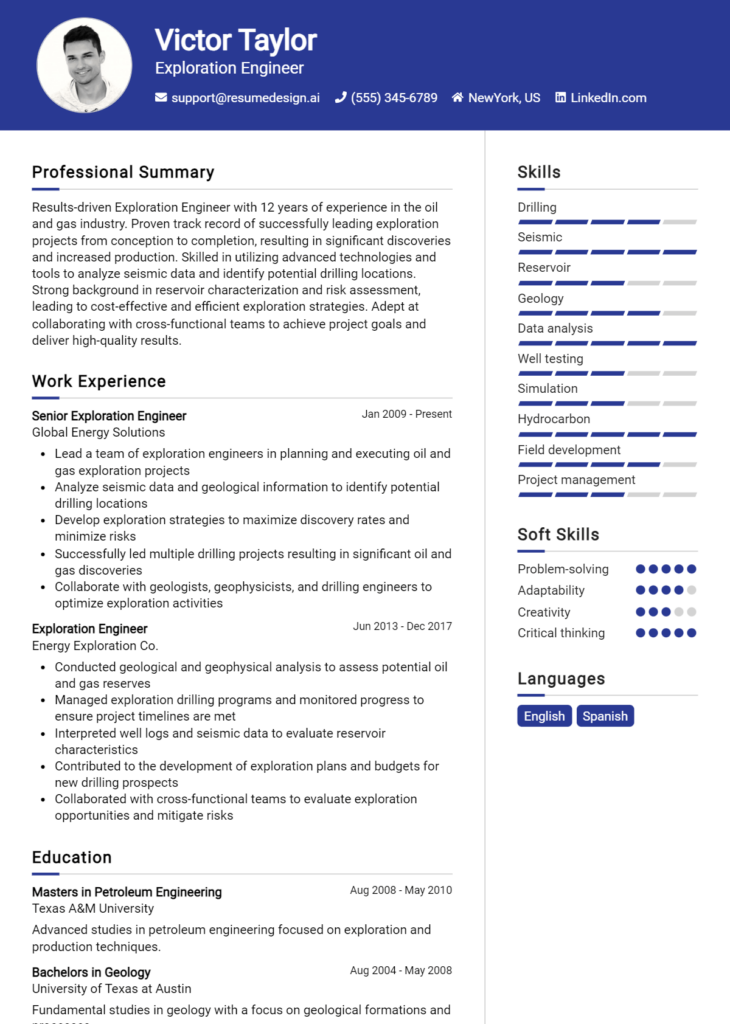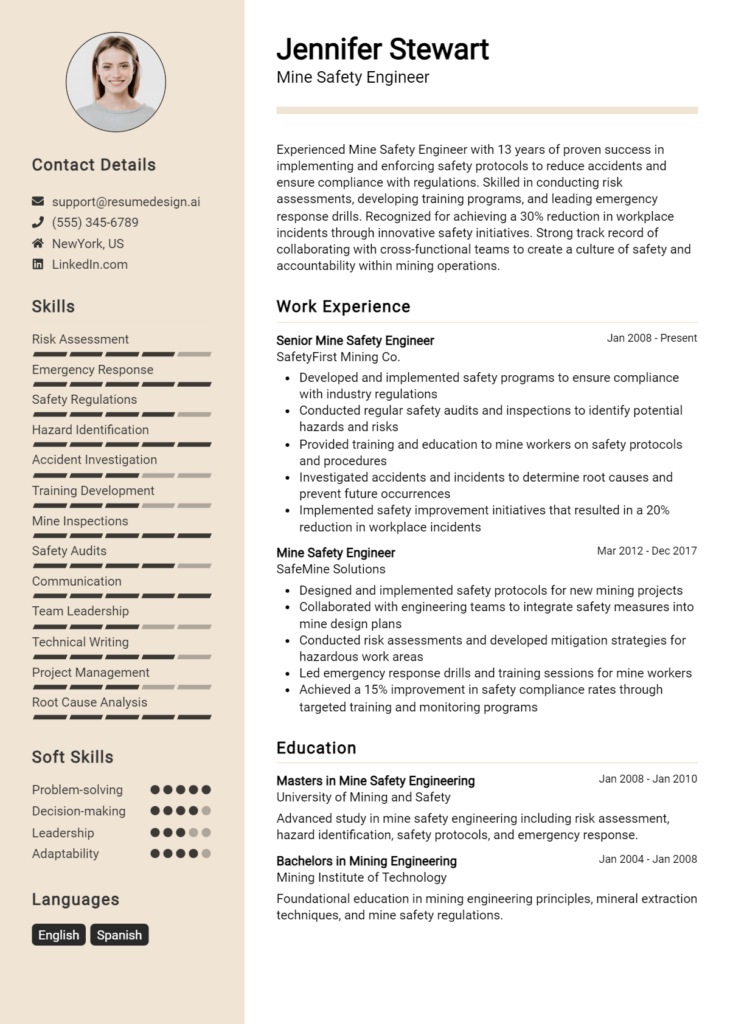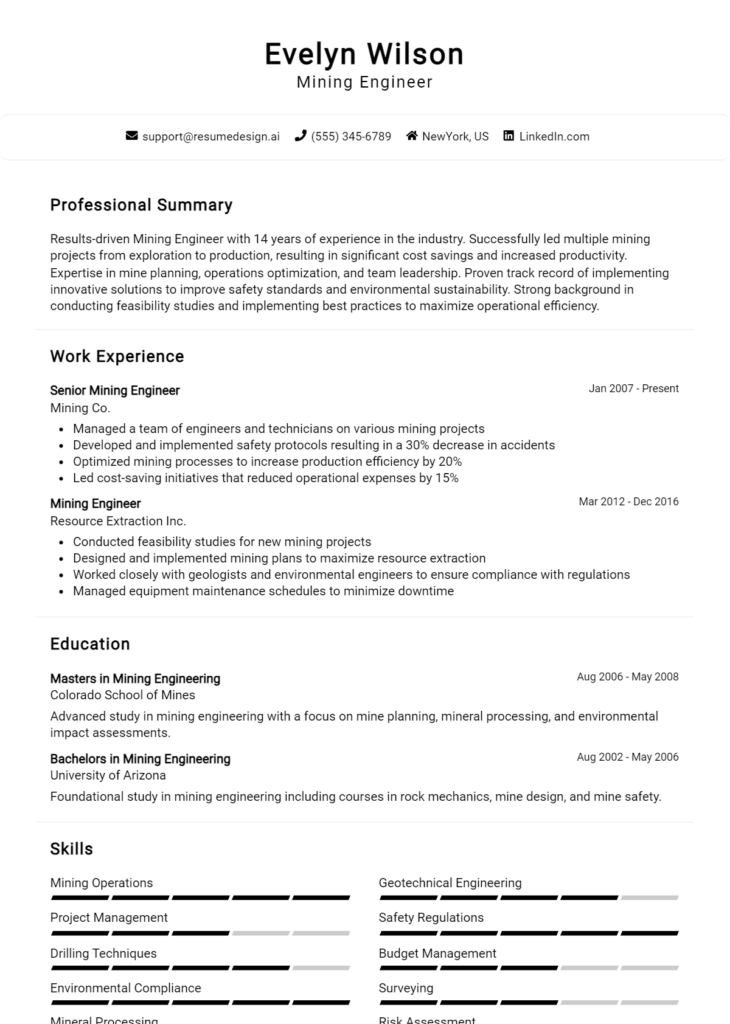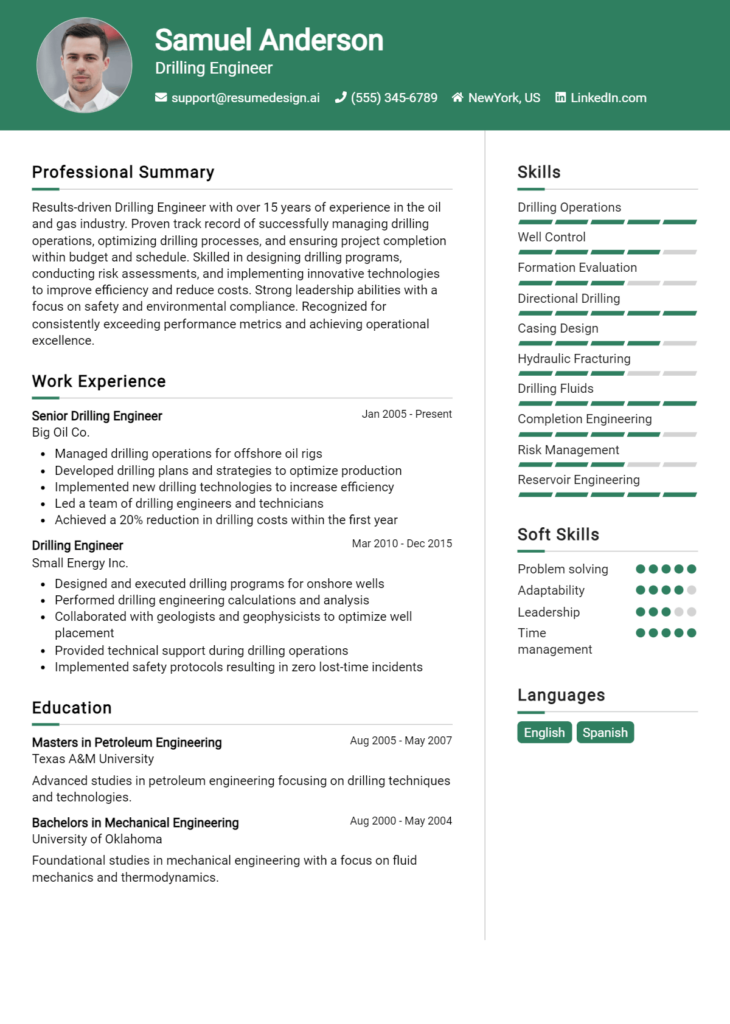Oil Sands Engineer Core Responsibilities
As an Oil Sands Engineer, you are pivotal in integrating various departments, including geology, production, and environmental science, to optimize extraction processes. Your core responsibilities encompass designing and overseeing operations, ensuring safety compliance, and implementing innovative technologies. Essential skills include strong analytical capabilities, technical expertise, and effective problem-solving, which contribute significantly to achieving organizational goals. A well-structured resume can highlight these competencies, showcasing your ability to enhance operational efficiency and drive project success.
Common Responsibilities Listed on Oil Sands Engineer Resume
- Designing and optimizing oil sands extraction processes.
- Conducting feasibility studies and risk assessments.
- Collaborating with cross-functional teams to ensure project alignment.
- Monitoring and analyzing production data to improve efficiency.
- Implementing safety and environmental regulations.
- Developing and managing project budgets and timelines.
- Conducting site inspections and troubleshooting operational issues.
- Staying updated on industry trends and technological advancements.
- Preparing technical reports and presentations for stakeholders.
- Training and mentoring junior engineers and technical staff.
- Participating in community engagement and sustainability initiatives.
High-Level Resume Tips for Oil Sands Engineer Professionals
In the competitive field of Oil Sands Engineering, a well-crafted resume is not just a document; it’s your first opportunity to make a lasting impression on potential employers. It serves as a vital marketing tool that needs to effectively showcase your skills, achievements, and relevant experience. A strong resume can set you apart from other candidates by clearly reflecting your understanding of the industry and your ability to contribute to a prospective employer's success. This guide will provide practical and actionable resume tips specifically tailored for Oil Sands Engineer professionals, ensuring that your application stands out in a crowded field.
Top Resume Tips for Oil Sands Engineer Professionals
- Tailor your resume to the specific job description by using keywords and phrases that match the requirements outlined in the posting.
- Highlight relevant experience in oil sands extraction, processing technologies, and environmental management to demonstrate your suitability for the role.
- Quantify your achievements with specific metrics, such as production increases, cost savings, or efficiency improvements, to provide concrete evidence of your impact.
- Showcase industry-specific skills, such as knowledge of SAGD (Steam Assisted Gravity Drainage), reservoir engineering, or environmental compliance.
- Include certifications and licenses relevant to the oil sands industry, like H2S Alive or First Aid, to enhance your qualifications.
- Utilize action verbs and concise language to convey your responsibilities and achievements effectively, making your resume easy to read.
- Incorporate a professional summary at the top of your resume that highlights your unique value proposition as an Oil Sands Engineer.
- Keep your resume to one or two pages, ensuring that all information is relevant and impactful to maintain the reader’s interest.
- Proofread your resume multiple times to eliminate any errors in grammar, spelling, or formatting, as attention to detail is crucial in engineering roles.
By implementing these tailored resume tips, you can significantly increase your chances of landing a job in the Oil Sands Engineer field. A strong resume not only captures your qualifications but also demonstrates your commitment to excellence, positioning you as a top candidate in this dynamic industry.
Why Resume Headlines & Titles are Important for Oil Sands Engineer
In the highly specialized field of oil sands engineering, a well-crafted resume headline or title plays a crucial role in capturing the attention of hiring managers. A strong headline can serve as an immediate summary of a candidate's key qualifications and expertise, allowing them to stand out in a competitive job market. It should be concise, relevant, and directly related to the specific position being applied for, effectively highlighting the candidate's unique strengths and making a lasting impression from the outset.
Best Practices for Crafting Resume Headlines for Oil Sands Engineer
- Keep it concise: Aim for a headline that is brief yet informative, ideally one sentence or phrase.
- Be role-specific: Tailor your headline to reflect the oil sands engineering position you are targeting.
- Highlight key skills: Incorporate relevant technical skills or certifications that align with the job requirements.
- Use action-oriented language: Strong verbs can convey confidence and capability.
- Include quantifiable achievements: If possible, mention specific accomplishments that demonstrate your impact in previous roles.
- Stay professional: Maintain a professional tone that reflects the seriousness of the engineering field.
- Avoid jargon: While industry terms are important, ensure your headline is accessible to a broad audience.
- Revise and optimize: Continuously refine your headline based on feedback and job descriptions.
Example Resume Headlines for Oil Sands Engineer
Strong Resume Headlines
"Experienced Oil Sands Engineer Specializing in Enhanced Oil Recovery Techniques"
“Innovative Oil Sands Engineer with 10+ Years in Sustainable Resource Development”
“Results-Driven Oil Sands Project Manager with Proven Track Record in Cost Reduction”
Weak Resume Headlines
“Engineer Looking for Job”
“Oil Sands Engineer with Experience”
The strong resume headlines are effective because they are specific, highlighting the candidate's experience and key strengths in a way that aligns with the job requirements. They convey a clear message about the candidate's qualifications and what they bring to the table, which can pique the interest of hiring managers. In contrast, the weak headlines fail to impress due to their vagueness and lack of detail; they do not provide enough information about the candidate’s specific skills or accomplishments, making it difficult for recruiters to see their value at a glance.
Writing an Exceptional Oil Sands Engineer Resume Summary
An exceptional resume summary is crucial for an Oil Sands Engineer, as it serves as the first impression for hiring managers. This brief yet powerful statement succinctly encapsulates key skills, relevant experience, and notable accomplishments that align with the specific job role. A strong summary can quickly engage recruiters, making them more inclined to delve deeper into the resume. Therefore, it is essential that the summary is concise, impactful, and tailored to the job for which the candidate is applying, ensuring it reflects their unique qualifications and contributions to the field.
Best Practices for Writing a Oil Sands Engineer Resume Summary
- Quantify achievements: Use numbers and statistics to demonstrate the impact of your work.
- Focus on relevant skills: Highlight technical skills and competencies that are directly applicable to oil sands engineering.
- Tailor to the job description: Customize the summary to reflect the specific requirements and keywords from the job listing.
- Keep it concise: Aim for 3-5 sentences that deliver maximum impact without unnecessary fluff.
- Showcase accomplishments: Mention specific projects or initiatives that resulted in measurable success.
- Use action verbs: Start sentences with strong action verbs to convey a sense of proactivity and effectiveness.
- Maintain a professional tone: Ensure the language is formal and suitable for the engineering field.
- Highlight certifications: If applicable, include any relevant certifications or specialized training that enhances your candidacy.
Example Oil Sands Engineer Resume Summaries
Strong Resume Summaries
Dynamic Oil Sands Engineer with over 8 years of experience in optimizing extraction processes, resulting in a 15% increase in production efficiency. Proficient in advanced simulation software and project management, leading cross-functional teams to deliver projects under budget and ahead of schedule.
Results-driven Oil Sands Engineer skilled in implementing innovative technologies that reduce environmental impact. Successfully managed a $5 million project that decreased greenhouse gas emissions by 20% while maintaining operational output.
Detail-oriented Oil Sands Engineer with a strong background in thermal recovery methods and reservoir management. Achieved a 30% reduction in operational costs through strategic resource allocation and process improvements on multiple projects.
Weak Resume Summaries
Oil Sands Engineer with experience in the oil industry looking to find a challenging position.
Dedicated professional with knowledge of oil sands processes and a desire to contribute to a team.
The examples of strong resume summaries are considered effective because they provide specific achievements, quantify results, and demonstrate relevant skills that align with the role of an Oil Sands Engineer. In contrast, the weak summaries lack detail, fail to mention any accomplishments, and appear generic, making it difficult for hiring managers to gauge the candidates' qualifications or potential contributions to the company.
Work Experience Section for Oil Sands Engineer Resume
The work experience section of an Oil Sands Engineer resume is critical as it provides a comprehensive overview of the candidate's technical skills, project management abilities, and capability to deliver high-quality products in a challenging and complex environment. This section not only highlights the specific engineering competencies pertinent to oil sands operations but also emphasizes the candidate's experience in leading teams, implementing innovative solutions, and achieving measurable results. Quantifying achievements and aligning work history with industry standards are essential to demonstrate the candidate's value to potential employers and to differentiate them from other applicants.
Best Practices for Oil Sands Engineer Work Experience
- Focus on relevant technical skills such as process optimization, drilling techniques, and environmental compliance.
- Quantify achievements with specific metrics, such as production increases, cost reductions, or project timelines met.
- Highlight leadership roles in team projects, showcasing your ability to manage cross-functional teams.
- Align experiences with industry standards and best practices to demonstrate familiarity with current technologies and methodologies.
- Use action verbs to convey a sense of impact and achievement in your role.
- Include specific examples of successful projects, emphasizing your contributions and outcomes.
- Tailor the work experience section to match the job description, ensuring relevant skills and experiences are prioritized.
- Incorporate feedback or recognition received from peers or supervisors to validate your contributions.
Example Work Experiences for Oil Sands Engineer
Strong Experiences
- Led a team of 15 engineers in the successful implementation of a new extraction process, resulting in a 20% increase in production efficiency and a cost savings of $3 million annually.
- Managed the design and execution of a water treatment facility that reduced operational costs by 25% while ensuring compliance with environmental regulations.
- Collaborated with cross-functional teams to develop a predictive maintenance program that decreased equipment downtime by 30%, significantly improving overall plant reliability.
- Developed and executed a comprehensive training program for junior engineers, enhancing team capabilities and fostering a culture of safety and innovation.
Weak Experiences
- Worked on various projects related to oil sands operations.
- Assisted with engineering tasks in the field.
- Participated in team meetings and contributed ideas.
- Helped with documentation and reporting for projects.
The examples labeled as strong illustrate clear, quantifiable achievements and specific contributions to projects, showcasing leadership and technical expertise. They reflect a proactive approach and a results-oriented mindset. In contrast, the weak experiences lack detail and specificity, failing to convey impact or demonstrate the candidate's skills and contributions effectively. Utilizing strong examples in the work experience section can significantly enhance an Oil Sands Engineer's resume and appeal to potential employers.
Education and Certifications Section for Oil Sands Engineer Resume
The Education and Certifications section of an Oil Sands Engineer resume plays a crucial role in establishing the candidate's qualifications and expertise in a highly specialized field. This section not only highlights the academic background, such as degrees in engineering or geology, but also showcases industry-relevant certifications and continuous learning efforts that are essential in keeping up with advancements in technology and environmental practices. By providing relevant coursework, specialized training, and recognized credentials, candidates can significantly enhance their credibility and demonstrate their alignment with the specific requirements of the Oil Sands Engineer role.
Best Practices for Oil Sands Engineer Education and Certifications
- Emphasize relevant degrees such as Petroleum Engineering, Chemical Engineering, or Environmental Science.
- Include industry-recognized certifications like Professional Engineer (P.Eng) or Certified Engineering Technician (CET).
- Highlight any specialized training or workshops focused on oil sands extraction, environmental management, or resource sustainability.
- Provide details of relevant coursework that directly relates to oil sands technology or project management.
- Use clear and specific language to describe certifications and educational achievements.
- Keep the section concise but informative, focusing on qualifications relevant to the Oil Sands Engineer position.
- Update the section regularly to reflect any new certifications or educational advancements.
- Consider including online courses or continuing education relevant to the oil sands industry to showcase a commitment to lifelong learning.
Example Education and Certifications for Oil Sands Engineer
Strong Examples
- Bachelor of Science in Petroleum Engineering, University of Alberta, 2018
- Certified Professional Engineer (P.Eng), Association of Professional Engineers and Geoscientists of Alberta, 2019
- Specialized Training in Oil Sands Extraction Technologies, Canadian Institute of Mining, 2020
- Relevant Coursework: Advanced Thermodynamics, Reservoir Engineering, and Environmental Impact Assessment
Weak Examples
- Bachelor of Arts in History, University of Toronto, 2015
- Certification in Basic First Aid, Red Cross, 2021
- Online Course in Social Media Marketing, Coursera, 2022
- High School Diploma, XYZ High School, 2010
The strong examples are considered relevant because they directly align with the qualifications needed for an Oil Sands Engineer, showcasing degrees, certifications, and specialized training that are critical in the industry. In contrast, the weak examples are deemed irrelevant as they do not pertain to the oil sands sector or engineering principles, highlighting the importance of focusing on qualifications that enhance a candidate's suitability for the role.
Top Skills & Keywords for Oil Sands Engineer Resume
As an Oil Sands Engineer, possessing the right set of skills is crucial for demonstrating expertise and enhancing your resume's effectiveness. A well-crafted resume not only showcases technical knowledge but also highlights interpersonal abilities that are essential in collaborative environments. Employers seek candidates who can navigate complex challenges while maintaining a strong focus on safety, environmental stewardship, and efficiency. By emphasizing both hard and soft skills, you can create a compelling narrative that reflects your qualifications and readiness to contribute to the oil sands industry. For more insights on how to enhance your resume, check out resources for skills and work experience.
Top Hard & Soft Skills for Oil Sands Engineer
Soft Skills
- Strong communication skills
- Team collaboration and leadership
- Problem-solving abilities
- Adaptability and flexibility
- Critical thinking
- Time management
- Attention to detail
- Conflict resolution
- Creativity and innovation
- Stakeholder engagement
Hard Skills
- Knowledge of oil sands extraction processes
- Proficiency in reservoir engineering
- Familiarity with environmental regulations
- Data analysis and modeling skills
- Experience with production optimization techniques
- Understanding of geotechnical engineering principles
- Proficient in CAD software and simulation tools
- Project management expertise
- Knowledge of drilling and completion techniques
- Familiarity with safety management systems
Stand Out with a Winning Oil Sands Engineer Cover Letter
As a highly motivated and skilled Oil Sands Engineer, I am excited to apply for the position at your esteemed organization. With a robust background in petroleum engineering and extensive experience in oil sands extraction and processing, I am well-equipped to contribute to your team’s success. My hands-on experience with advanced extraction technologies and my commitment to sustainable practices make me a strong candidate for this role.
In my previous position at [Previous Company Name], I successfully led a project that optimized production processes, resulting in a 20% increase in efficiency while reducing environmental impacts. My work involved collaborating with multidisciplinary teams to implement innovative solutions, including enhanced oil recovery techniques and waste management strategies. I am adept at utilizing data analysis and modeling software to forecast production trends and analyze reservoir performance, skills that I believe are essential for driving success in the ever-evolving oil sands sector.
Moreover, I am passionate about safety and environmental stewardship. I have actively participated in developing safety protocols and training programs that have significantly improved workplace safety metrics. Understanding the importance of community engagement, I am committed to fostering positive relationships with local stakeholders and ensuring that our operations align with community values and environmental regulations.
I am eager to bring my expertise in oil sands engineering to [Company Name] and contribute to your mission of embracing innovation while maintaining environmental responsibility. I look forward to the opportunity to discuss how my background, skills, and enthusiasms align with the goals of your organization. Thank you for considering my application; I hope to speak with you soon to explore the potential for collaboration.
Common Mistakes to Avoid in a Oil Sands Engineer Resume
When crafting a resume for the role of an Oil Sands Engineer, it’s crucial to present your skills and experiences effectively. Subtle errors can detract from your qualifications and make it difficult for hiring managers to see your potential. Avoiding common mistakes can significantly improve your chances of landing an interview. Here are some pitfalls to steer clear of:
Generic Objective Statement: Using a vague or generic objective statement can make your resume blend in with countless others. Tailor your objective to reflect your specific interest in oil sands engineering and the position you're applying for.
Ignoring Keywords: Many employers utilize Applicant Tracking Systems (ATS) to filter resumes. Failing to include relevant keywords from the job description can lead to your application being overlooked.
Overloading with Technical Jargon: While technical skills are essential, overloading your resume with jargon can make it difficult for non-technical hiring managers to understand your qualifications. Balance technical terms with clear explanations.
Lack of Quantifiable Achievements: Simply listing job responsibilities without demonstrating achievements can weaken your resume. Use quantifiable metrics to highlight your contributions, such as "increased production efficiency by 15%."
Neglecting Education and Certifications: In a specialized field like oil sands engineering, omitting relevant education and certifications can be a significant oversight. Ensure these details are prominent and up-to-date.
Typos and Grammatical Errors: Spelling mistakes and grammatical errors can create a negative impression and suggest a lack of attention to detail. Proofread your resume multiple times and consider having someone else review it.
Using an Unprofessional Email Address: An unprofessional email address can detract from your credibility. Use a simple email address that includes your name or initials for a more professional appearance.
Failing to Customize for Each Application: Sending out the same resume for multiple applications can be detrimental. Customize your resume for each position to reflect the specific skills and experiences that align with the job requirements.
Conclusion
As an Oil Sands Engineer, you play a crucial role in one of the most complex and vital sectors of the energy industry. Your expertise in extraction methods, environmental management, and resource optimization is essential for driving innovation and sustainability in oil sands development. This article has covered several key areas, including the technical skills required, the importance of safety protocols, the evolving landscape of energy production, and the significance of regulatory compliance.
In addition to your technical abilities, effective communication and teamwork are paramount in this role, as you will often collaborate with multidisciplinary teams to achieve project goals. Staying updated with the latest industry trends and advancements will further enhance your career prospects.
As you reflect on the insights shared in this article, take a moment to review your Oil Sands Engineer resume. Highlight your relevant skills, experiences, and accomplishments to stand out in this competitive field. To assist you in this process, we encourage you to utilize the following resources:
- Explore resume templates to find a design that suits your professional style.
- Use the resume builder for an easy and efficient way to create a polished resume.
- Review resume examples to gain inspiration and understand industry standards.
- Don’t forget to craft a compelling cover letter using our cover letter templates to complement your resume.
Take action today and ensure your resume reflects the expertise and value you bring as an Oil Sands Engineer!

